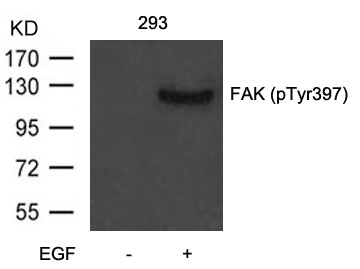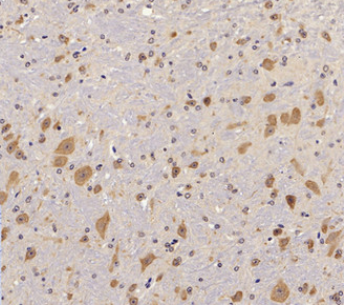

| WB | 咨询技术 | Human,Mouse,Rat |
| IF | 咨询技术 | Human,Mouse,Rat |
| IHC | 1/50-1/100 | Human,Mouse,Rat |
| ICC | 技术咨询 | Human,Mouse,Rat |
| FCM | 咨询技术 | Human,Mouse,Rat |
| Elisa | 咨询技术 | Human,Mouse,Rat |
| Aliases | FAK; FAK1; PTK2 |
| Entrez GeneID | 5747; |
| WB Predicted band size | 125kDa |
| Host/Isotype | Rabbit IgG |
| Antibody Type | Primary antibody |
| Storage | Store at 4°C short term. Aliquot and store at -20°C long term. Avoid freeze/thaw cycles. |
| Species Reactivity | Human,Mouse,Rat |
| Immunogen | Peptide sequence around phosphorylation site of tyrosine 397(D-D-Y(p)-A-E)derived from Human FAK. |
| Formulation | Purified antibody in PBS with 0.05% sodium azide. |
+ +
以下是3篇关于FAK (Phospho-Tyr397)抗体的代表性文献摘要:
---
1. **文献名称**: *Focal adhesion kinase: in command and control of cell motility*
**作者**: Parsons JT, et al.
**摘要**: 该文献综述了FAK在细胞迁移中的核心作用,重点强调其Tyr397自磷酸化位点在激活下游信号通路(如PI3K/Akt和Ras-MAPK)中的关键机制,并验证了Phospho-Tyr397抗体的特异性在多种细胞模型中的检测应用。
2. **文献名称**: *Role of focal adhesion kinase in integrin signaling*
**作者**: Schlaepfer DD, et al.
**摘要**: 研究通过Phospho-Tyr397抗体证实了整合素介导的细胞粘附会诱导FAK在Tyr397位点的磷酸化,进而招募Src家族激酶形成复合物,促进肿瘤细胞侵袭和存活。抗体用于免疫沉淀和免疫印迹验证实验。
3. **文献名称**: *Antibody validation for phospho-specific antibodies: a case study with FAK Y397*
**作者**: Ueki Y, et al.
**摘要**: 本文系统评估了多种市售Phospho-Tyr397抗体的特异性,通过敲除/敲低实验、肽段竞争实验及质谱分析,确认了该抗体在免疫组化、流式细胞术中的可靠性,并指出不同实验条件对检测结果的影响。
---
以上文献均聚焦于FAK Tyr397磷酸化位点的功能机制及抗体应用验证,适用于信号通路研究或实验方法参考。
The FAK (Phospho-Tyr397) antibody detects the activated form of Focal Adhesion Kinase (FAK), a non-receptor tyrosine kinase critical for regulating cell adhesion, migration, and survival. FAK localizes to focal adhesions, dynamic structures linking the extracellular matrix to the cytoskeleton. Upon integrin-mediated cell adhesion or growth factor stimulation, FAK undergoes autophosphorylation at tyrosine residue 397 (Y397), a key step in its activation. This phosphorylation creates a binding site for Src-family kinases, forming a FAK-Src signaling complex that triggers downstream pathways like MAPK, PI3K/AKT, and Rho GTPases, influencing cell motility, proliferation, and apoptosis.
The FAK (Phospho-Tyr397) antibody specifically recognizes this phosphorylation event, serving as a biomarker for FAK activation. It is widely used in cancer research, as FAK overexpression and hyperactivation at Y397 correlate with tumor progression, metastasis, and poor prognosis. Researchers employ this antibody in techniques like Western blotting, immunofluorescence, and immunohistochemistry to study FAK signaling dynamics in cellular models, tissues, or therapeutic responses. Its specificity helps dissect FAK's role in physiological processes (wound healing, embryonic development) and pathological conditions (fibrosis, angiogenesis, drug resistance). Validating phosphorylation status with this antibody aids in understanding FAK-related mechanisms and evaluating targeted therapies.
×